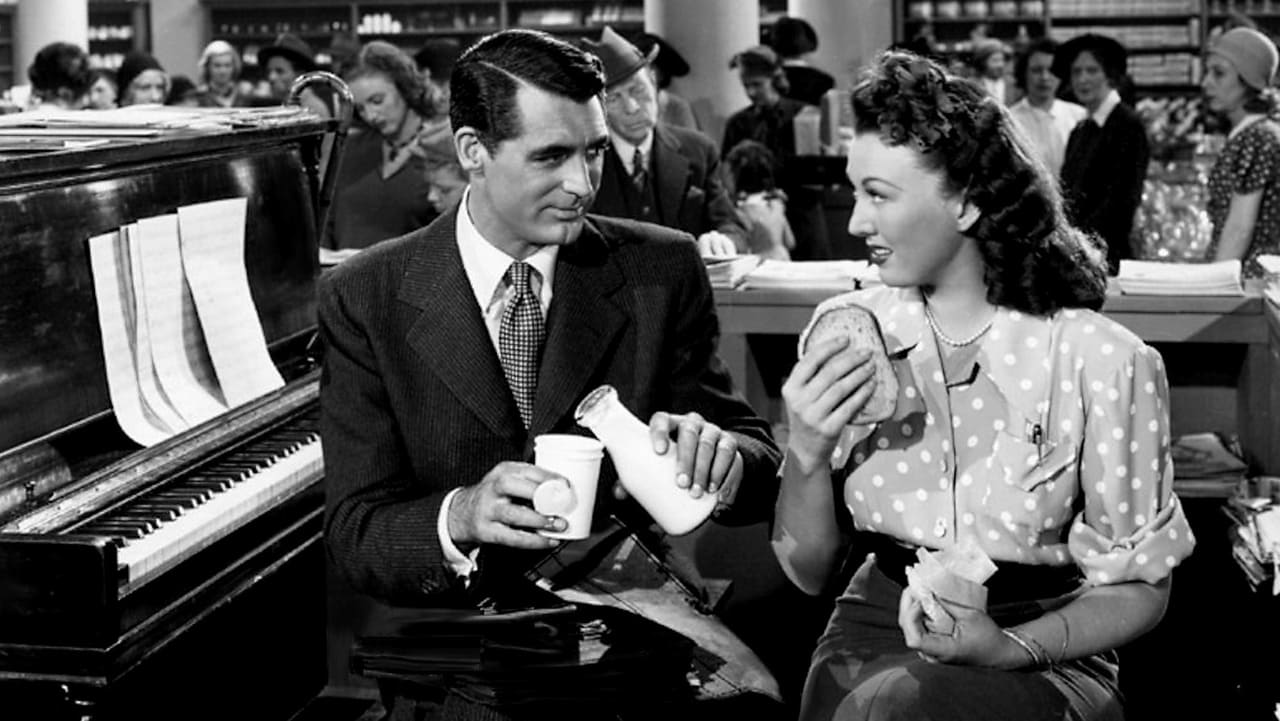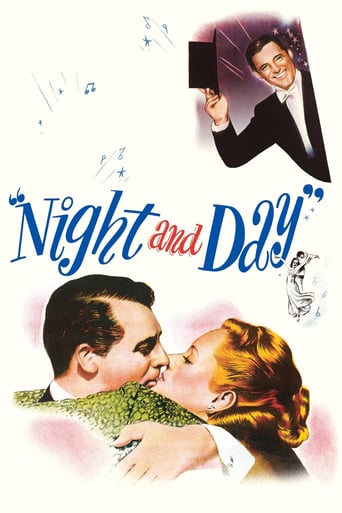



Please don't spend money on this.
This is a tender, generous movie that likes its characters and presents them as real people, full of flaws and strengths.
View MoreIt's easily one of the freshest, sharpest and most enjoyable films of this year.
View MoreThere is, somehow, an interesting story here, as well as some good acting. There are also some good scenes
View MoreIt is hard to give Cary Grant any less than a 6 which he usually gets just for stepping on the lot. He does well here but since the story is so fictional it is hard to buy him in the title role. He does have a good director and solid supporting cast. Then there is the music of Cole Porter. Where Grant is miscast, the music saves the film from the whitewashed and spun dry story. Eve Arden looks young and very appealing in this movie, not the school ma-rm type of role that would dominate her later career. Even with Grant having to bring across a made up Porter with a script that with the production codes being very restricted, it almost comes off. Hey, these feel good musicals appealed very much to an audience that was relieved the war was over and getting ready to enjoy peace. There would be other attempts to create the mood here the next couple of years. Big Studio Hollywood was the all star stuff dreams are made of. This film is a perfect example.
View MoreJust a few comments: 1. The image quality of the 2004 Warner Home Video DVD is not up to their usual high standard. Some parts of the film, especially the early portion are very sub-par, scratches, washed out color, and out of registration Technicolor (color fringing, image lacking sharpness). Later portions of the film look as good as modern restorations of 1940's Technicolor do.2. It's doubtful Warners would have had to pay MGM and especially RKO to use Porter songs written for their films, as one reviewer conjectured; Warners owned and still owns the publisher of Porter's music, and Porter probably had enough clout to own rights to his songs rather than the studios some were written for.3. Personally, I find the film inferior in many respects. Except for Mary Martin, the song renditions are a bore. Ginny Simms, the primary vocalist in the picture, had a pleasant trained voice, but her style was bland and she was a zero in the charisma department. The dances and the way they are filmed are mediocre, far below what MGM would have done in this period. Cary Grant often seems uncomfortable in the film, trying to mask this with an insincere smile. Alexis Smith's beautiful face and the believable emotions it's expressing are nearly ruined by the garish, over the top makeup she saddled with. The musical arrangements are merely adequate, very inferior to what the arrangers at MGM and Fox contributed to their musical films, and also very inferior to what Night and Day's music director-arranger Ray Heindorf was capable of later in his career (for example A Star Is Born, and Pete Kelly's Blues).
View MoreWarner Brothers must have pumped a lot of cash into this production. It's splashy, moves quickly, and has beaucoup musical numbers. I wish it had somehow all paid off.Cary Grant was at his peak here in 1946, but he looks too old to be a Yalie. He doesn't look OLD. He never looked old, even when he was old, just as he never looked boyish. He seemed to just reach middle adulthood and stay there for fifty years.That wouldn't necessarily be a problem but he's not only the central figure but he's in every scene except the musical numbers, and he's in some of them too with his faux tenor, his vibrato making the walls tremble. Nobody else is of much significance. Monty Wooley should be funny, and perhaps he was in 1946, when beards were oddities. Alexis Smith looks glorious in glorious Technicolor.The film itself is almost a musical review, with episodes from somebody's fantasy of Cole Porter's escapades stuck in between. It's kind of an interesting problem. Porter wrote both music and lyrics, and some of them are playful ("You're the Top") and others blue-hued in their melancholy ("In the Still of the Night"). So why doesn't it play? What's the difference between this and, say, "Singin' in the Rain," given that this film has a more dramatic element. For one thing, there's no dancing to speak of here. One number, "I've Got You Under My Skin" is clumsily choreographed, the dancer seeming to practice her yoga mudrahs, a kind of manual of hands. It's okay when a musical lacks believability. Who believed any of Fred and Ginger's plots? What it lacks is exuberance.Porter's involvement in World War I (that's 1914 to 1918, kids) is romanticized. He gets the idea of "Begin the Beguine" from listening to shell bursts or something -- well, listening to what appear to be Morroccan troops humming in the gloomy night like darkies anyway. Somehow the film links his later, disabling riding accident to his wounds in the war and presents it in the most sentimentalized of ways. I mean, the guy is like FDR struggling to the stage to make his first speech. His homosexuality of course isn't even hinted at. But the writing is pretty careless throughout. The audience loses track of what the year is or what the name of the play is.Well, not to put the production down too much. The songs we hear are Porter's most popular and sophisticated, and they're popular for good reason. Porter was one of a dozen or so marvelous composers and lyricists who made the American stage blossom in the 30 years from 1925 to 1955. What a gang! Irving Berlin, another outstanding composer/lyricist of the period, couldn't even read music or play the piano except in one key! The music alone makes the movie worth watching once. Will someone explain to me what's happened to American vernacular music?
View MoreUnlike film biographies of George Gershwin, Jerome Kern, and Sigmund Romberg or for that matter Rodgers&Hart, those artists were gone by the time the silver screen told their stories. But Cole Porter was very much still with us when Night and Day was released in 1946 and some of his best work was yet to come.If Cole Porter had his druthers Cary Grant would never have played the part of himself. Porter fancied himself as more the Fred Astaire type. But given the nature of what happened to Porter in his life, a dancing Cole Porter was out of the question.There's not too much that's accurate in this film. Cole Porter was born and raised in Indiana in affluent surroundings. Yes he went to Yale and his best and lifelong friend that he acquired from Yale was Monty Woolley. Yes he did marry the older and glamorous Linda Lee Thomas. And yes he composed some of the most beautiful and sophisticated songs ever done.Of course his marriage to Linda Lee was a sham. In the vernacular of the time Linda served as his beard, his cover as it were because Cole Porter was gay. As was his lifelong friend Monty Woolley.Were they ever involved with each other. Maybe as youths, but from what I've heard their tastes were different. Porter liked his male partners as sophisticated as he was and as beautiful as his songs were. Monty on the other hand was known for picking up street kids from Maine to California until he died.One thing that was true although glamorized for the film, Porter did serve in the French army during World War I. No wounds however, no hearing of African rhythms from Senegalese troops were he got the idea for Night and Day.Night and Day sure jumbles up even the order of his shows. Porter was writing songs from before Yale, but he did not score a commercial musical comedy hit until the show Paris in 1928 where the song Let's Do It was featured. I sure didn't know that In the Still of the Night was originally done as a Christmas Carol way back in his youth for instance.In fact Where the Still of the Night, along with I've Got You Under My Skin, Rosalie, and Easy to Love were all written for MGM musicals. You can take it to the bank that Louis B. Mayer soaked Jack Warner for plenty to get those songs heard in a Warner Brothers film. Similarly the title song Night and Day, heard in The Gay Divorce on Broadway first, made its screen debut in RKO's The Gay Divorcée. Jack Warner must have paid RKO plenty for that one also.The other true thing is the fall from a horse that Porter suffered in the late thirties, the constant pain he was in all of his life. It took 28 operations to save his legs back in the thirties. In 1958 long after the story in the film ended, Porter did eventually lose a leg and from then on lived as a recluse in his suite at the Waldorf Towers. Linda Lee Thomas Porter had passed away about a decade before.Alexis Smith plays Linda Lee here and the cast of Night and Day also includes Jane Wyman, Dorothy Malone, Selena Royle, Tom D'Andrea, Henry Stephenson, Donald Woods. Playing themselves are Mary Martin and Monty Woolley. Singer Ginny Simms of the Kay Kyser band sang many of the Porter tunes for the film.Night and Day certainly captures Porter's sophistication. Of course the gay lifestyle and a pretty hedonistic one at that which Porter led would not be shown at all back in the days of the Code. Some might complain about that pleasure driven pursuit that Porter had his whole life. If he sought beauty and pleasure in the world, Cole Porter certainly gave enough of it back to the world to justify it.After Night and Day, Cole Porter had still yet to write such film scores as The Pirate, High Society, and Les Girls and such Broadway shows as Kiss Me Kate, Out of this Wolrd, Can-Can, and Silk Stockings. You could score a film with just the material he had yet to write. It's not a great biographical film, but Night and Day provides as good an excuse as any to listen and appreciate the art that was Cole Porter.
View More